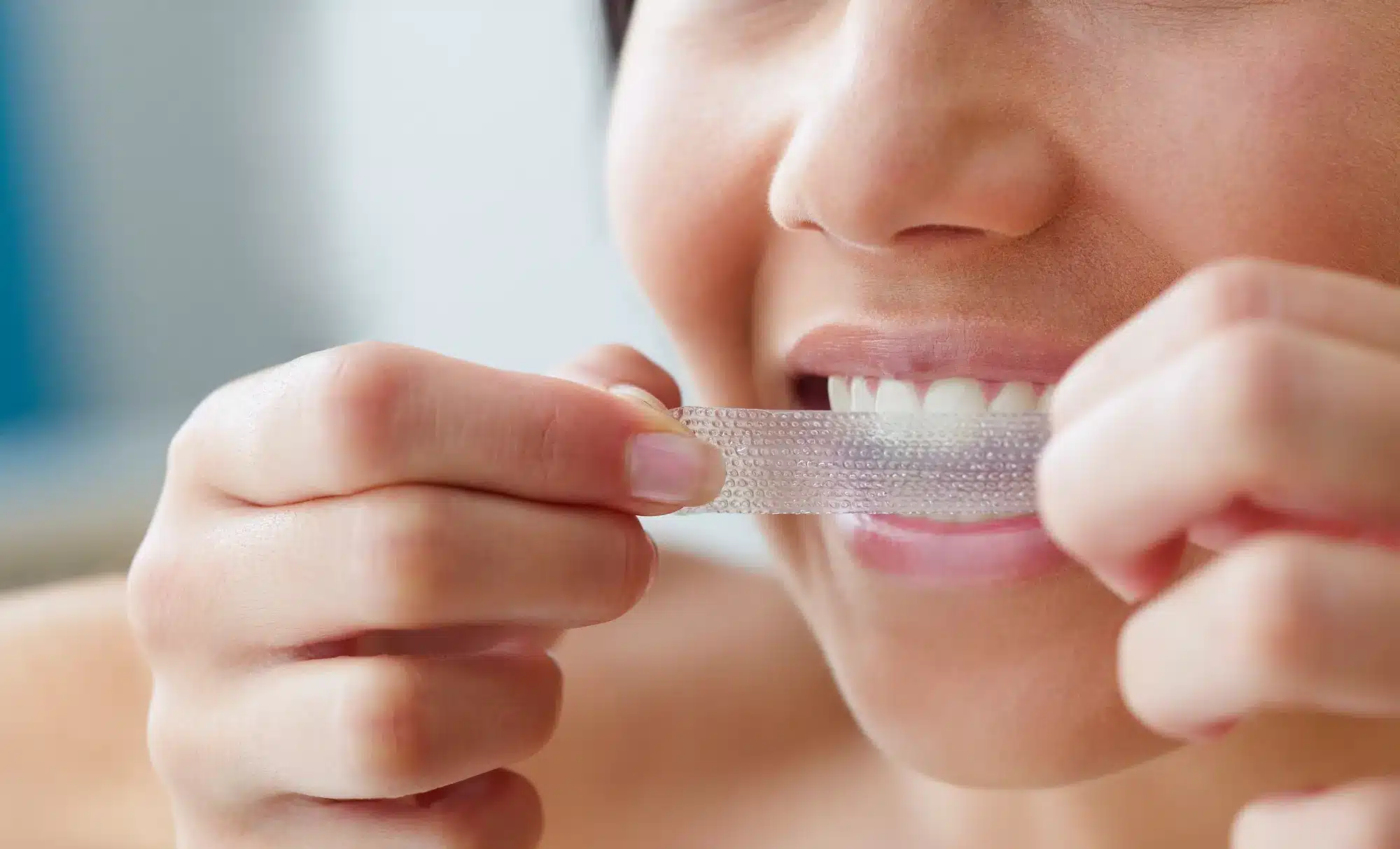6 Safety Rules for At-Home Whitening from A Cosmetic Dentist in London
At-home teeth whitening has surged in popularity across the UK, offering a convenient way to brighten smiles without the need for frequent dental visits. However, the accessibility of whitening kits, strips, and gels comes with risks if not used correctly. Misuse can lead to tooth sensitivity, enamel damage, or gum irritation. This article outlines six essential safety rules to ensure effective and safe at-home whitening, tailored for those seeking a brighter smile in London and beyond.
Dr. Sahil Patel a cosmetic dentist in London at MaryleboneSmileClinic offers practical advice on at-home teeth whitening safety: “Always consult a dental professional before starting any whitening treatment to ensure your teeth and gums are healthy. Using products with safe peroxide levels and following instructions precisely is crucial to avoid sensitivity or damage. For personalised guidance, visit our website to learn more about safe whitening practices.” This initial consultation with a cosmetic dentist in London can set the foundation for a successful whitening experience.
Rule 1: Consult a Dentist Before Starting
Before purchasing an at-home whitening kit, a dental check-up is essential to confirm that your teeth and gums are suitable for whitening. Conditions such as cavities, gum disease, or worn enamel can make whitening unsafe, as bleaching agents may penetrate damaged areas, causing pain or further harm. A professional assessment ensures that any underlying issues are addressed first, reducing the risk of adverse effects.
In London, where cosmetic dentistry is highly sought after, many individuals turn to professionals for guidance. A cosmetic dentist in London can evaluate your oral health and recommend products tailored to your needs. This step is particularly important for those with restorations like crowns or veneers, as whitening agents only affect natural teeth, potentially leading to uneven results. By starting with a consultation, you ensure that your whitening journey is both safe and effective.
Rule 2: Choose Products with Safe Peroxide Levels
The active ingredients in most whitening products are hydrogen peroxide or carbamide peroxide, which break down stains to lighten teeth. In the UK, regulations limit over-the-counter whitening products to a maximum of 0.1% hydrogen peroxide, while dentist-prescribed kits can contain up to 6%. Higher concentrations are more effective but require professional supervision to prevent damage.
Using products with excessive peroxide, often found in unregulated online kits, can erode enamel and irritate gums. Always check for the UK or EU safety certification on packaging and avoid products with vague ingredient lists. Opting for kits recommended by a cosmetic dentist in London ensures compliance with safety standards. For example, dentist-dispensed trays with custom-fitted moulds deliver controlled amounts of gel, minimising contact with gums and reducing sensitivity risks.
Rule 3: Follow Manufacturer Instructions Precisely
Every whitening product comes with specific instructions regarding application time, frequency, and duration of use. Overusing whitening strips, leaving gels on too long, or applying treatments more often than recommended can lead to enamel wear and increased sensitivity. For instance, some strips are designed for 30-minute daily use over 14 days, while others may require overnight application.
Deviating from these guidelines in pursuit of faster results is a common mistake. A 2024 study published in the British Dental Journal found that overuse of whitening products was linked to a 20% increase in reported tooth sensitivity among UK users. To avoid this, set a timer during applications and adhere to the recommended treatment schedule. If sensitivity occurs, pause the treatment and consult a dentist for advice on desensitising products or adjusted protocols.
Rule 4: Protect Your Gums and Soft Tissues
Whitening gels can irritate gums if they leak from trays or strips. Prolonged exposure may cause redness, swelling, or even chemical burns. To prevent this, use products with well-fitted applicators, such as custom trays provided by a dentist. Over-the-counter trays often fit poorly, increasing the risk of gel seepage.
Before applying whitening gel, consider using a barrier like petroleum jelly on your gums to shield them from irritation. If using strips, ensure they align precisely with your teeth and avoid overlapping onto gum tissue. Should irritation occur, rinse your mouth thoroughly and refrain from further applications until the discomfort subsides. A cosmetic dentist in London can provide additional protective measures, such as anti-sensitivity gels, to enhance comfort during treatment.
Rule 5: Avoid Whitening if Unsuitable
Not everyone is a candidate for at-home whitening. Pregnant or breastfeeding women should avoid whitening due to limited safety data on peroxide effects during these periods. Children under 16 are also advised against whitening, as their enamel is still developing and more prone to damage. Individuals with sensitive teeth or allergies to peroxide should seek alternatives, such as professional cleaning or whitening toothpastes with mild abrasives.
Those with dental restorations, such as fillings or crowns, must be cautious, as whitening can create a mismatched appearance. A 2023 survey by the British Dental Association noted that 15% of at-home whitening users reported uneven results due to restorations. Consulting a dentist beforehand helps identify whether whitening is appropriate or if other cosmetic options, like veneers, are better suited to your needs.
Rule 6: Maintain Good Oral Hygiene Post-Whitening
After completing a whitening treatment, maintaining results requires diligent oral care. Teeth are more susceptible to staining immediately after whitening due to temporarily opened enamel pores. For the first 48 hours, avoid acidic or staining foods and drinks, such as coffee, red wine, and citrus fruits. Opt for neutral, light-coloured foods like rice, chicken, or dairy products to minimise re-staining.
Brushing twice daily with a fluoride toothpaste and flossing regularly helps prevent plaque build-up, which can attract stains. Regular dental cleanings, ideally every six months, remove surface stains and tartar, prolonging whitening effects. Using a straw for beverages and rinsing your mouth after consuming staining foods further protects your smile. These habits not only preserve whiteness but also support overall oral health, reducing the need for frequent touch-ups.
Understanding the Risks of At-Home Whitening
While at-home whitening is generally safe when done correctly, potential risks include tooth sensitivity, enamel erosion, and gum irritation. Sensitivity, the most common side effect, affects up to 60% of users, according to a 2024 study in the Journal of Dentistry. It typically resolves within days but can persist if products are overused. Enamel erosion, though rare, occurs with prolonged exposure to high-peroxide products, leading to weaker, yellower teeth over time.
Gum irritation arises from poor-fitting applicators or excessive gel application. In severe cases, unregulated products with high peroxide levels can cause nerve inflammation, necessitating treatments like root canals. These risks underscore the importance of professional guidance and adherence to safety rules. By prioritising caution, users can minimise complications and enjoy a brighter smile confidently.
Why Professional Supervision Matters
In London’s competitive cosmetic dentistry scene, professional supervision offers significant advantages over DIY approaches. Dentists provide access to higher-strength whitening agents, custom-fitted trays, and tailored advice, ensuring safer and more effective results. A cosmetic dentist in London can also monitor progress, adjusting treatments to prevent sensitivity or uneven whitening.
Unregulated products, often marketed online, pose serious risks. The British Dental Association reported in 2025 that some seized kits contained up to 33% hydrogen peroxide, far exceeding safe limits. Such products can cause irreversible damage, including gum recession and tooth loss. By choosing dentist-supervised whitening, you avoid these dangers and benefit from expert oversight, particularly valuable in a city with access to top-tier dental care.
Alternatives to At-Home Whitening
For those hesitant about at-home whitening, professional in-office treatments offer a controlled alternative. Using advanced technologies like LED lights or lasers, these procedures deliver dramatic results in a single session, often lightening teeth by up to eight shades. While more expensive, they minimise risks through precise application and protective measures for gums.
Whitening toothpastes and rinses provide milder options for maintenance. These products contain low levels of abrasives or peroxides, removing surface stains without penetrating enamel. However, their effects are limited, typically lightening teeth by one shade. Regular dental cleanings also enhance brightness by removing plaque and tartar, serving as a non-invasive complement to whitening.
Long-Term Smile Maintenance
Sustaining a white smile requires ongoing effort beyond initial whitening. Lifestyle factors, such as smoking or frequent consumption of staining beverages, accelerate discoloration. Cutting back on these habits extends whitening longevity. Touch-up treatments, recommended every six to twelve months, maintain brightness without overexposing teeth to peroxides.
Incorporating whitening toothpastes into your routine supports daily maintenance, but avoid overuse, as abrasives can wear enamel over time. Electric toothbrushes with polishing modes enhance stain removal, while fluoride mouthwashes strengthen enamel, reducing sensitivity risks. Regular dental visits ensure early detection of issues, preserving both aesthetics and health.
Navigating Whitening in London’s Dental Landscape
London’s vibrant dental market offers diverse whitening options, from high-street clinics to boutique practices. Choosing a reputable provider is critical, especially for at-home kits requiring professional oversight. Researching clinics with General Dental Council registration and patient reviews ensures quality care. Marylebone, known for its advanced cosmetic dentistry, is a hub for safe and effective whitening solutions.
By adhering to these six safety rules—consulting a dentist, selecting safe products, following instructions, protecting gums, assessing suitability, and maintaining hygiene—you can achieve a radiant smile without compromising oral health. Whether you’re preparing for a special event or seeking everyday confidence, safe at-home whitening, guided by professional expertise, delivers lasting results in London’s dynamic dental scene.



